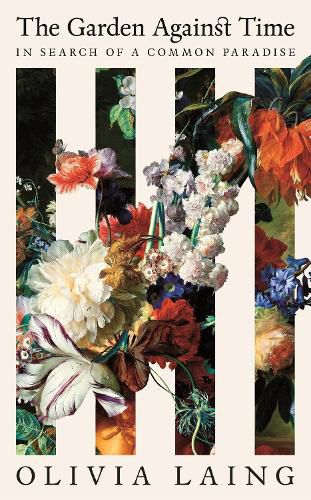Readings Newsletter
Become a Readings Member to make your shopping experience even easier.
Sign in or sign up for free!
You’re not far away from qualifying for FREE standard shipping within Australia
You’ve qualified for FREE standard shipping within Australia
The cart is loading…






'A garden contains secrets, we all know that: buried elements that might put on strange growth or germinate in unexpected places. The garden that I chose had walls, but like every garden it was interconnected, wide open to the world . . .'
In 2020, Olivia Laing began to restore a walled garden in Suffolk, an overgrown Eden of unusual plants. The work drew her into an exhilarating investigation of paradise and its long association with gardens. Moving between real and imagined gardens, from Milton's Paradise Lost to John Clare's enclosure elegies, from a wartime sanctuary in Italy to a grotesque aristocratic pleasure ground funded by slavery, Laing interrogates the sometimes shocking cost of making paradise on earth.
But the story of the garden doesn't always enact larger patterns of privilege and exclusion. It's also a place of rebel outposts and communal dreams. From the improbable queer utopia conjured by Derek Jarman on the beach at Dungeness to the fertile vision of a common Eden propagated by William Morris, new modes of living can and have been attempted amidst the flower beds, experiments that could prove vital in the coming era of climate change.
The result is a beautiful and exacting account of the abundant pleasures and possibilities of gardens: not as a place to hide from the world but as a site of encounter and discovery, bee-loud and pollen-laden.
$9.00 standard shipping within Australia
FREE standard shipping within Australia for orders over $100.00
Express & International shipping calculated at checkout
Stock availability can be subject to change without notice. We recommend calling the shop or contacting our online team to check availability of low stock items. Please see our Shopping Online page for more details.
'A garden contains secrets, we all know that: buried elements that might put on strange growth or germinate in unexpected places. The garden that I chose had walls, but like every garden it was interconnected, wide open to the world . . .'
In 2020, Olivia Laing began to restore a walled garden in Suffolk, an overgrown Eden of unusual plants. The work drew her into an exhilarating investigation of paradise and its long association with gardens. Moving between real and imagined gardens, from Milton's Paradise Lost to John Clare's enclosure elegies, from a wartime sanctuary in Italy to a grotesque aristocratic pleasure ground funded by slavery, Laing interrogates the sometimes shocking cost of making paradise on earth.
But the story of the garden doesn't always enact larger patterns of privilege and exclusion. It's also a place of rebel outposts and communal dreams. From the improbable queer utopia conjured by Derek Jarman on the beach at Dungeness to the fertile vision of a common Eden propagated by William Morris, new modes of living can and have been attempted amidst the flower beds, experiments that could prove vital in the coming era of climate change.
The result is a beautiful and exacting account of the abundant pleasures and possibilities of gardens: not as a place to hide from the world but as a site of encounter and discovery, bee-loud and pollen-laden.
I have always enjoyed the way Olivia Laing writes. Just as mycelium grows from a single reference point outward in many directions, Laing creates a web of insight and interconnections that carry the reader through her curiosity and storytelling. The Garden Against Time is no exception, ranging through the lives and work of Milton, William Morris, Thomas Moore, John Clare, Derek Jarman and the aristocratic Middletons, among others, to question what a garden is; what people, ideas and costs shape these seemingly idyllic spaces, and what they mean in a broader socio-cultural and political context. Hinged particularly on Milton, and how his ‘Paradise Lost’ is inextricable from colonial thought, this inquiry is grafted onto what is essentially a memoir.
For Laing, garden ownership was something she aspired to through years of rental instability and finally found in Suffolk with her husband during the pandemic. They both became custodians for almost a hectare, designed by the late landscape architect Mark Rummary. Her writing about rejuvenating Rummary’s garden is fertile with beautiful descriptions of wine glass crocus and tiny iris flowers revealing themselves as she navigates the anxieties of honey fungus, along with her own personal upheavals.
These were my favourite parts of the book; feasting on lists of species whose fragrance almost wafted off the page. However, the inclusion of so many references to historical figures, gardens and artwork, though fascinating, was also overwhelming at times. Much of the book assumed knowledge I didn’t have, and by the end I was thirsty for visual references of garden varietals, paintings and photography – references I have never needed when reading her other titles.
So for The Garden Against Time, I advise patience. It is a beautiful book best read in a well-known garden, where you can break to sit on a bench and contemplate the artful or useful beauty around you. Or, as Laing reflects upon, the unconscionable cost of gardens originally created for those who grew rich off the backs of enslaved African people in the ‘new world’, for whom the gardens were perhaps an avenue for spending an accumulation of money so large they could not think of anything else to do with it.
See what the Readings’ team have to say on the blog, discover related events and podcast episodes.
Discover the wonders of nature in this fascinating and awe-inspiring collection.
Running from October 3–31, Spring Fling brings together a lineup of change-makers, rule-breakers and singular storytellers to challenge your preconceptions and foster new ways of thinking. Explore some of this year's programmed voices below and book your tickets via The Wheeler Centre website.